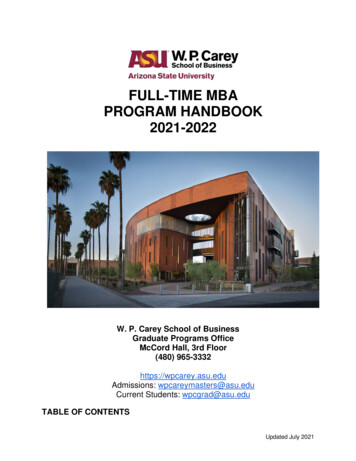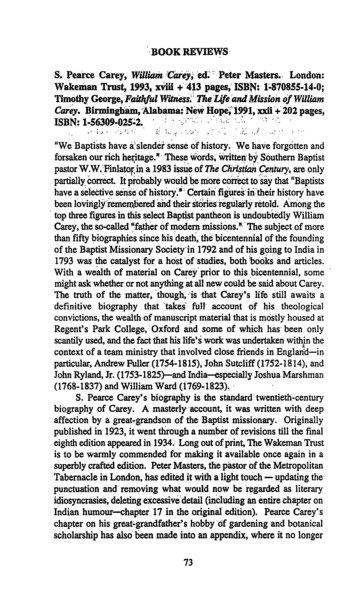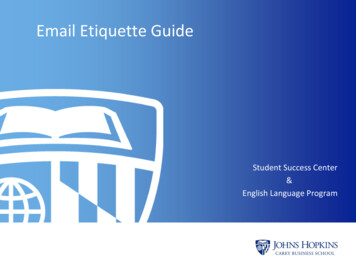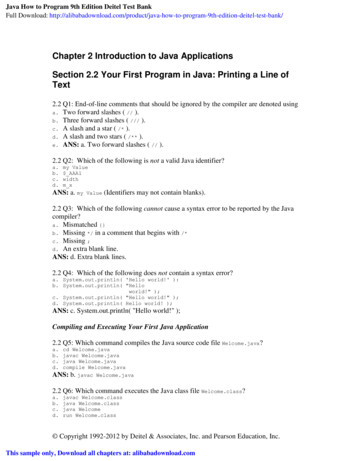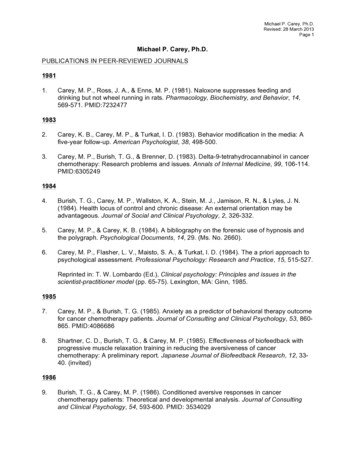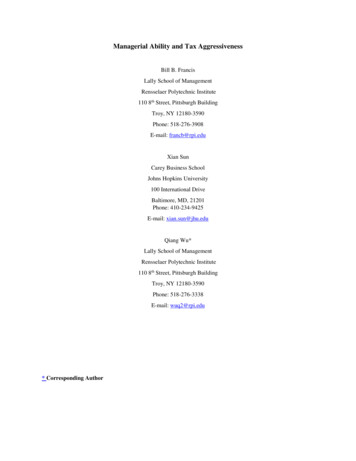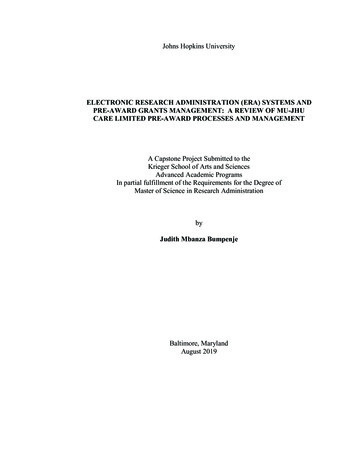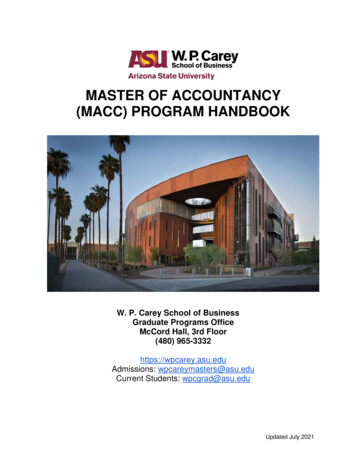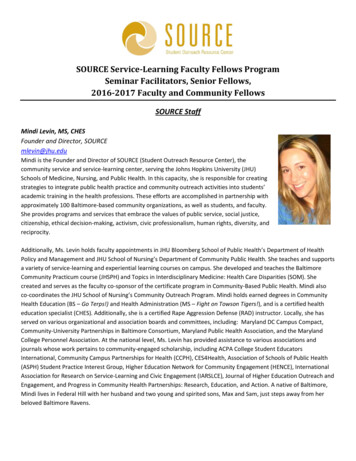![Welcome [carey.jhu.edu]](/img/15/gmba-welcome-packet-class-2020.jpg)
Transcription
WelcomeGlobal MBA Class of 2020
This Welcome Packet has been prepared by the Carey Business School Global MBA Program Office toprovide information to incoming fulltime GMBA students.The Carey Business School reserves the right to change without notice any programs, policies, orrequirements included within.Johns Hopkins Carey Business School100 International Drive, 5th FloorBaltimore, MD 21202-1099Web: carey.jhu.edu
DeanFacultyGlobal MBA 2020Welcome PacketAcademicsOrientationGetting StartedInformation Neededfor Life at Carey
Bernard T. FerrariDean, Johns Hopkins Carey Business SchoolBernard T. Ferrari is professor and dean of the Johns Hopkins CareyBusiness School. He joined the Carey Business School as its seconddean in July 2012.Under Ferrari’s leadership, the Carey Business School earnedaccreditation from the Association to Advance Collegiate Schools ofBusiness (AACSB), experienced tremendous growth with increasedstudent enrollment, more full-time faculty, and the establishment ofnew graduate degree programs. He also organized Carey’s academicand research initiatives under four key domains: Enterprise RiskManagement, Health Care Management, Real Estate andInfrastructure, and Financial Services.Before joining the Carey Business School, Ferrari was a director at the global management consultingfirm McKinsey & Company, where he spent nearly two decades leading McKinsey’s health care practiceand the firm’s North American corporate strategy practice. After retiring from McKinsey in 2008, hefounded and became chairman of the Ferrari Consultancy, serving clients in the financial services,transportation, energy, medical products, aviation, and heavy- equipment manufacturing sectors.Ferrari is a cum laude graduate of the University of Rochester, where he also earned his M.D. He beganhis professional career as a surgeon and later was chief operating officer and assistant medical directorof the Ochsner Clinic in New Orleans. Subsequently, he earned a J.D. magna cum laude from the LoyolaUniversity School of Law and an Executive M.B.A. from the Tulane University School of Business.Ferrari is a member of the Board of Trustees of the University of Rochester. In 2012, the universityawarded him the Dean’s Medal in recognition of his achievements and service. He is a member of theCouncil on Foreign Relations and a former trustee of the Juilliard School. He is married to Linda Ferrari, aformer commercial banker and an active docent at the Metropolitan Museum of Art in New York.His papers have been published in The Journal of the American Medical Association, McKinsey Quarterly,and The New England Journal of Medicine. His book Power Listening: Mastering the Most CriticalBusiness Skill of All was published in March 2012 and was named by WealthManagement.com as one ofthe 10 best business books of the year.1
May 2018Dear Carey Student:It gives me great pleasure to welcome you to the Johns Hopkins Carey Business School. As amember of the Global Master of Business Administration Class of 2020, you are poised for achallenging journey that will impact your life in powerful and positive ways.The Carey Business School was founded at Johns Hopkins University through the vision ofthe late philanthropist William P. Carey. He believed that business education could helpbuild a better society. This guiding principle transformed the university’s business programinto the AACSB-accredited business school that Carey is today.In choosing the Johns Hopkins Carey Business School, you will be joining a special placewhere business is taught with humanity in mind. Led by the experienced Carey faculty, yourcourses will present business concepts in a rigorous and integrated framework thatemphasizes practical applications while challenging you to address real-world problems. Ourlearning environment fosters thoughtful analysis of critical business issues through theapplication of leadership, technology, business principles, and ethics. Special emphasis isplaced on experiential learning as you work with businesses and nongovernmentalorganizations around the globe.In addition to the day-to-day support you will receive from the dedicated faculty and staff ofthe Carey School, you will benefit from being part of Johns Hopkins University. All of us,individually and collectively, are committed to your success in the Global MBA program.So again, welcome to Johns Hopkins University and the Carey Business School. I wish you awonderful experience filled with discovery and achievement.Sincerely,Bernard T. FerrariProfessor and DeanOffice of the Dean100 International Drive Baltimore, MD 21202-1099 Office Phone 410-234-9210 www.carey.jhu.edu2
MEET THE FACULTYOzge Sahin, PhDGMBA Academic Program Director, Associate Professor410.234.9417ozge.sahin@jhu.eduOzge Sahin is an Associate Professor of Operations Management and BusinessAnalytics at the Johns Hopkins University Carey Business School. She received her PhDand MS degrees in Operations Research from Columbia University, New York. Herresearch interests include pricing and revenue management with emphasis on consumer behavior, andstrategic capacity management.Ozge’s research uses mathematical models to gain insights into such revenue and capacity managementdecisions. Some of her recent research projects include new pricing plans for access services andimplications on consumer behavior, assortment optimization, pricing strategies for ancillary services andcapacity management of conditional products. Ozge has published papers in prestigious academicjournals including Management Science, Operations Research, Manufacturing and Service OperationsManagement, among others. She currently teaches a course on advanced business analytics, and hastaught operations management and revenue management courses in the past. Prior to joining Carey,Ozge served on the faculty of Ross School of Business at University of Michigan.Yuval Dan Bar-Or, PhDAssistant Professor410.773.9443ybaror1@jhu.eduDr. Bar-Or is a leading expert in decision-making in the context of risk. He has lecturedextensively in academic and professional settings on the subjects of decision making,risk management, and financial literacy. He has been a contributor on Forbes.com and has been quotedin various media, including The Wall Street Journal, Bloomberg BusinessWeek, The Baltimore Sun,TheStreet.com, American Public Media, Bankrate.com, Washingtonian, Investopedia.com,AdvisorOne.com, InvestmentNews.com, The Arizona Republic, Consumers Digest, FoxBusiness.com, USNews & World Report, Treasury & Risk, Morningstar.com, and RIABiz.com.Prior to joining The Carey Business School, Dr. Bar-Or held senior strategy and operations roles withsome of the world's leading risk management firms, including KMV and Algorithmics. His roles haveincluded managerial responsibilities in New York, San Francisco, Toronto, London, Singapore, andSydney. His risk management expertise has assisted companies in management of over a trillion dollarsin assets. He holds Ph.D. and M.A. degrees in finance from the Wharton School of the University of3
Pennsylvania, as well as an engineering degree (B.Eng.) and two economics degrees (B.A. summa cumlaude, M.A.) from Canada’s McMaster University.James R. Calvin, PhDProfessor410.234.9409jcalvin@jhu.eduJames Calvin, PhD, (Communication, Culture, and Phenomenology, New YorkUniversity) joined the Carey Business School in 1996. He is Professor, Management andOrganization in the practice track with expertise in the areas of leadership development, communityeconomic development, and public sector and nonprofit organizations. He holds a secondary facultyappointment in the Urban Health Institute at the Bloomberg School of Public Health.Dr. Calvin has management and work experience in business (retail and TV broadcast). He has extensivework experience in the nonprofit sector including education, public policy, community capacity buildingand government in the United States and internationally. James is faculty lead for the course Innovationfor Humanity. In the area of executive leadership development and organizational development, Dr.Calvin has consulted with Fannie Mae, General Electric, Verizon, KPMG, GENCO, PepsiCo, Target, XeroxQuality Services, the Brookings Institution, QVC Inc., The World Bank; and NASA and GSA among otherFederal Agencies. James conducts research in global leadership and minority leadership development;culture, change and diversity management, and community leadership development andtransformation. He co-edited a book ‘Innovative Community Responses to Disaster’ published byRoutledge. He is a member of the 2017 Solutions Summit Selection Committee at the United Nations. Heserves on several national and international journal editorial boards including Academy of ManagementLearning and Education Journal (AMLE), Advanced Management Journal (AMJ), and CommunityDevelopment Journal (CDJ). James earned a B.F.A. from the Rochester Institute of Technology. His M.A.and Ph.D. (with distinction) with a concentration in phenomenology, culture and communication arefrom New York University.Maqbool Dada, PhDProfessor410.234.9413dada@jhu.eduMaqbool Dada, PhD (Management, Sloan School of Management, MassachusettsInstitute of Technology) joined the Carey Business School in 2009. He is a Professor inthe research track with expertise in the areas of operations management, supply chain management,and pricing models. Maqbool Dada brings to the Carey Business School a long track record of expertisein the vital areas of operations management, supply-chain management, and pricing models. Previously,he was professor of management at Purdue University’s Krannert Graduate School of Management, aswell as coordinator of the operations management area at Purdue. He has been a faculty member atNorthwestern University’s Kellogg School of Management, the University of Chicago’s Booth School ofBusiness, and the College of Business Administration at the University of Illinois in Chicago. Dada, whoearned his PhD in management at MIT’s Sloan School of Management, has served as editor for a numberof scholarly journals, including Decision Sciences and Management Science.4
Tinglong Dai, PhDAssistant Professor410.234.9415dai@jhu.eduTinglong Dai, PhD (Operations Management, Tepper School of Business, CarnegieMellon University), joined the Johns Hopkins Carey Business School in 2013. He is anAssistant Professor of Operations Management and Business Analytics in the research track, withexpertise in the areas of healthcare analytics, marketing-operations interfaces, and operations inartificial intelligence (AI).Professor Dai’s research has been published in leading journals such as Management Science,Manufacturing & Service Operations Management, Operations Research, and INFORMS Journal onComputing. He is on the Editorial Review Board of Production and Operations Management Journal. Heis founder and co-chair of Johns Hopkins Symposium on Healthcare Operations, and the co-editor of theHandbook of Healthcare Analytics (John Wiley & Sons, August 2018).Professor Dai has received numerous awards, including 2015 Johns Hopkins Discover Award, 2017INFORMS Public Sector Operations Research Best Paper Award, 2012 INFORMS Pierskalla Award for theBest Paper in Healthcare (runner-up), and 2012 Production and Operations Management Society BestHealthcare Paper Award.Kabir Dutta, MBA, PhDAssistant Professor410.234.9403kdutta1@jhu.eduKabir Dutta received PhD in Financial Engineering from the University of Pennsylvania,MBA in Finance from the Wharton School of the University of Pennsylvania and MS inComputer Science from the Courant Institute of Mathematical Sciences of the New York University. He isan Assistant professor of Finance in the practice track with expertise in financial risk management,stability of financial institutions, information economics, and operational risk.He has extensive experience and held several senior positions across various industries such astelecommunication, energy, exploration and production, management consulting, financial services, andfinancial regulation.5
Brian Gunia, PhDAssociate Professor410.234.9423brian.gunia@jhu.eduBrian Gunia, PhD (Management & Organizations, Northwestern University) joined theJohns Hopkins Carey Business School in 2011. He is an Associate Professor in theresearch track with expertise in the ways that people can help themselves and their organizationalcolleagues act more ethically and/or negotiate more effectively.Dr. Gunia received the Johns Hopkins University Alumni Association Excellence in teaching award in2015 and the MPH/MBA Faculty Recognition Award in 2016. His teaching interests include Negotiations,Organizational Behavior, and Business Ethics.Erik Helzer, PhDAssistant Professor410.234.9281ehelzer1@jhu.eduErik Helzer, PhD (Cornell University) has been an Assistant Professor in the researchtrack at the Johns Hopkins Carey Business School from 2014. His research focuses onmoral character, ethical behavior, and decision-making. Dr. Helzer has published in such journals asPsychological Science, Personality and Social Psychology Bulletin, and Theory in Research and Education.Dr. Helzer’s honors and distinctions include the Society for Personality and Social Psychology StudentPublication Award (2013) and the Sage Graduate Fellowship at Cornell University.Hyeong-Min (Christian) Kim, PhDAssistant Professor410.234.9418chkim@jhu.eduHyeong-Min (Christian) Kim, PhD (Marketing, The Ross School of Business, Universityof Michigan) and MBA (Columbia University), joined the Carey Business School in 2008.He is an Associate Professor in the research track with expertise in the areas ofconsumer behavior and branding.Dr. Kim has extensively published at premier journals such as Journal of Consumer Research and Journalof Marketing Research. His research expertise has been recognized by major academic organizations likeAssociation for Consumer Research and Marketing Science Institute, and he has received numerousresearch awards including the Emerald Citation of Excellence award and the Franco Nicosia Best PaperAward. His research has been covered by major media such as the Independence, Times, New YorkTimes Magazine, and Men's Health Magazine.6
Nayoung Louie, PhDInstructor410.234.9318nayoung@jhu.eduNayoung Louie, PhD (Biomedical Engineering, Johns Hopkins University School ofMedicine) joined the Carey Business School in 2010. She received her Ph.D. in the fieldof brain imaging and computational anatomy. Dr. Louie collaborated with researchers and clinicians atUCLA, Northwestern University and University of New South Wales in Australia. Dr. Louie also worked ata start-up biotech company specializing in the adult stem cell technology as a medical consultant.Mario Macis, PhDAssociate Professor410.234.9431mmacis@jhu.eduMario Macis, PhD (Economics, University of Chicago) is an Associate Professor in theresearch track with expertise in the areas of prosocial behavior, morally controversialtransactions, global health, experimental economics, development economics, and labor economics. Heis also Associate Faculty at the Armstrong Institute for Patient Safety and Quality at the Johns HopkinsUniversity School of Medicine, Faculty Research Fellow in the National Bureau of Economic Research(NBER), and Research Fellow at the Institute for the Study of Labor (IZA). Dr. Macis has been aconsultant for the World Bank, the International Labor Organization, the National Marrow DonorProgram, and the United Nations Development Programme.Christopher Myers, PhDAssistant Professor410.234.9391cmyers@jhu.eduChristopher G. Myers, PhD (Management & Organizations, University of Michigan) is anAssistant Professor in the research track at the Johns Hopkins Carey Business School,with expertise in the areas of learning, development, and innovation. His researchexplores how people learn from their own experiences at work, as well as how people learn vicariouslyfrom others’ knowledge and experience, and he focuses in particular on learning in health careorganizations and other knowledge-intensive industries. Prior to joining Carey, he was an AssistantProfessor of Organizational Behavior at the Harvard Business School.7
Supriya Munshaw, PhDLecturer410.234.9430jni@jhu.eduSupriya Munshaw received her PhD in Computational Biology & Bioinformatics fromDuke University. After her post-doctoral fellowship in the Division of InfectiousDiseases at Johns Hopkins, Supriya joined Carey Business School’s Discovery to Marketproject team in August 2012. Her research expertise is in the field immunology and infectious diseases.She has always been a proponent of translational scientific research which piqued her interest incommercialization and pharmaceutical strategy. Her teaching interests include technology transfer,commercialization of early-stage technologies, and healthcare and pharmaceutical strategy.Colleen Stuart, PhDAssistant Professor410.234.9443cstuart9@jhu.eduColleen Stuart, PhD (Organizational Behaviour, University of Toronto) joined the JohnsHopkins Carey Business School in 2013. She is an Assistant Professor in the researchtrack with expertise in the areas of collaborative work, social networks and diversity. In one stream ofresearch she is interested in how collaborative work is accomplished under conditions of uncertainty. Asecond line of research looks at the means by which women overcome barriers in the workplace toachieve success, and the subsequent implications of this success. Professor Stuart’s research hasappeared in Organization Science and the Academy of Management Journal.Xian Sun, PhDAssistant Professor410.234.9425xian.sun@jhu.eduXian Sun is an assistant professor in Accounting and Finance at Carey Business Schoolof Johns Hopkins University. After she earned PhD in finance from RensselaerPolytechnic Institute in 2006, she worked as a senior economist at the Office of Comptroller of Currencyfor three years. She then joined Carey Business School in 2009. Her research interests include emergingmarkets, M&As, Creditor Rights and CEO compensation. She has published in prestigious journals suchas Journal of Financial and Quantitative Analysis, Journal of Banking and Finance, Journal ofInternational Money and Finance, and Journal of Corporate Finance.Dr. Sun received Dean's Award 2016, the On-The-Spot Awards, Office of the Comptroller of Currency,September 2007, December 2007, August 2008; and the Del and Edith Karger Dissertation Prize inManagement, RPI, May 2006.8
ACADEMIC CALENDAR 2018-2019GLOBAL MBA CLASS 2020SUMMER 2018July 26 – August 10August 13 – 16Summer Intensive (International Students Only)Orientation for Global MBA Class 2020FALL 2018August 20September 3Fall I session classes beginLabor Day Holiday, no classesOctober 16Fall I session classes endOctober 17Fall II session classes beginOctober 30Registration for Spring 2017 semester beginsNovember 21 – 24December 18Thanksgiving Holiday, no classesFall II session classes endSPRING 2019January 22Spring I session classes beginMarch 20Spring I session classes endMarch 21Spring II session classes beginMay 16Spring II session classes endSUMMER 2019June – AugustSummer InternshipThe full academic calendar for AY 2018-2019 can be found here.9
Global MBA Class of 2020Credit and Course Structure: 2-year programQuantitative Skills Boot CampOrientation – Week prior to Fall semesterY1 – Fall: 16 creditsFall 1 - 8 weeksMarketing Management (2 credits)BU.911.610Accounting Foundations (2 credits)BU.910.610Business Statistics (2 credits)BU.914.610Business Analytics (2 credits)BU.913.610Professional Development for Career Success (0 credits)BU.001.351Fall 2 - 8 weeksManagement and Organizational Behavior (2 credits)BU.930.632Corporate Finance (2 credits)BU.910.611Operations Management (2 credits)BU.912.611Business Microeconomics (2 credit)BU.930.633Innovation for Humanity Project (0 credit)BU.940.610January Intersession – Career Development ActivitiesY1 – Spring: 12 creditsSpring 1 - 8 weeksInnovation for Humanity (4 credits)3-week I4H residency(2018 locations: Rwanda, India, Peru, US)BU.940.611Solving Organizational Problems (1 credit)BU.930.630Effective Communication (1 credit)BU.930.610Spring 2 - 8 weeksInnovation for HumanityCompletion – beginning of Spring 2Judgement and Decision Making (2 credits)BU.913.611Financial Valuation (2 credits)BU.930.634Competitive Strategy (2 credits)BU.912.610Flexible Experiential Learning 2-4 credits (1-2 courses)Students are required to choose a second-year experiential courseExamples: Discovery to Market, City Lab, Health Services ImprovementY2 – Fall: 14 creditsFall 1 - 8 weeksFall 2 - 8 weeksElectives and/or Experiential Learning courseY2 – Spring: 12 creditsSpring 1 - 8 weeksSpring 2 - 8 weeksElectives and/or Experiential Learning courseExperiences in Leadership (2 credit)BU.930.631Ethical Leadership (2 credits)BU.932.6105/8/1810
GLOBAL MBA 2020 (Year 1)FALL SEMESTER 2018DayTime8:30 11:30AMFall 1Monday, August 20, 2018 toTuesday, October 16, 2018Cohort 1Cohort 2Fall 2Wednesday, October 17, 2018 toTuesday, December 19 2018Cohort 1Cohort 2Business StatisticsBU.914.610.G1Dept. facultyManagement andOrganizational BehaviorBU.930.632.G2Prof. Christopher MyersMon8/2010/15Tue8/2110/16Wed8/2210/101:30 4:30PMBusiness StatisticsBU.914.610.G2Dept. FacultyManagement andOrganizational BehaviorBU.930.632.G1Prof. Christopher Myers8:30 11:30AMMarketing ManagementBU.911.610.G2Prof. Christian KimCorporate FinanceBU.910.611.G1Prof. Yuval Bar-Or1:30 4:30PM8:30 –11:45AM8:30 –11:30AMThur8/2310/111.30 4:30PMFriday8/2410/12Marketing ManagementBU.911.610.G1Prof. Christian Kim8:30 –11:30AM1.30 4:30PMCorporate FinanceBU.910.611.G2Prof. Yuval Bar-OrBusiness MicroeconomicsBU.930.633.G1Prof. Mario MacisAccounting FoundationsBU.910.610.G1Prof. Xian Sun1:30 4:30PMAccounting FoundationsBU.910.610.G2Prof. Xian SunProfessional Developmentfor Career Success (0credit)BU.001.351.G18 Sessions, CareerDevelopment OfficeBusiness Analytics913.610.G1Prof. Maqbool DadaDayBusiness Analytics913.610.G2Prof. Maqbool DadaProfessionalDevelopment for CareerSuccess (0 credit)BU.001.351.G28 Sessions, CareerDevelopment ess MicroeconomicsBU.930.633.G2Prof. Mario MacisProfessional Developmentfor Career Success (0credit)BU.001.351.G18 Sessions, CareerDevelopment OfficeOperations ManagementBU.912.611.G1Prof. Tinglong DaiOperations ManagementBU.912.611.G2Prof. Tinglong DaiProfessional Developmentfor Career Success (0credit)BU.001.351.G28 Sessions, CareerDevelopment OfficeInnovation for Humanity Project (0 credits)BU.940.610.G1 (Both cohorts)Prof. James CalvinNovember 2, 2018December 14, 20188:30am – 5:00pmThur10/1912/14Friday10/2012/1511
GLOBAL MBA 2020COURSE DESCRIPTIONSAccounting FoundationsBU.910.610 (2 credits)Professor Xian SunThis course studies corporate finance and capital markets, emphasizing the financial aspects ofmanagerial decisions. The course touches on all areas of finance, including the valuation of real andfinancial assets, risk management and financial derivatives, the trade-off between risk and expectedreturn, and corporate financing and dividend policy. The course draws heavily on empirical research tohelp guide managerial decisions.Business AnalyticsBU.913.610 (2 credits)Professor Maqbool DadaThis course lays the analytical foundation for modeling that supports many managerial decisions thatentail tradeoffs among competing objectives. Building on concepts from Operations Research,Economics and Probability Theory, this course provides a basic introduction to a variety of resourceallocation problems.Business MicroeconomicsBU.930.633 (2 credits)Professor Mario MacisFoundations of microeconomic analysis. Frameworks for understanding consumer behavior, the firm’scost structure and capabilities, market structure and competitive strategy. Emphasis on fundamentalconcepts and applications. Topics include demand and supply, pricing, and the interaction of firms in avariety of industry settings (competition, monopoly, and oligopoly, introduction to game theory).Business StatisticsBU.914.610 (2 credits)Department FacultyStudents learn statistical techniques for further study in business, economics, and finance. The coursecovers descriptive statistics, probability, discrete and continuous random variables, hypothesis testing,and analysis of variance. The course emphasizes statistics to solve management problems. Case studies,spreadsheets, and computer software are used.12
Competitive StrategyBU.912.610 (2 credits)Department FacultyThis module requires students to assume the role of a general manager. General managers have to copewith tremendous complexity, uncertainty, and inadequate information. An important requirement of ageneral manager's job is the ability to think in a cross-functional and holistic manner. Creativity andinnovation are critical to achieving success, and so is the ability to execute and manage day to day. Theconcepts and frameworks to be covered in this course include Porter’s 5-forces Analysis, PEST Analysis,SWOT, emergent versus deliberate strategy, McKinsey Matrix, GE Growth/Share Matrix, Resource-BasedView of the Firm, Core Competencies and Dynamic Capabilities, Cost Leadership Strategies,Differentiation Strategies, Vertical Integration, Diversification, Life-Cycle Theory, Cost Accounting,Business Process Management, Inventory Management, Newsvendor Problem, Value Chain Analysis,Activity-Based Accounting, and Queueing Theory.Corporate FinanceBU.910.611 (2 credits)Professor Yuval Bar-OrThis Part 2 course studies corporate finance and capital markets, emphasizing the financial aspects ofmanagerial decisions. The course touches on all areas of finance, including the valuation of real andfinancial assets, risk management and financial derivatives, the trade-off between risk and expectedreturn, and corporate financing and dividend policy. The course draws heavily on empirical research tohelp guide managerial decisions.Effective CommunicationBU.930.610 (1 credit)Department FacultyEffective writing, presentation, and interpersonal communication skills are essential elements of themanager’s tool kit. The first Thought and Discourse Seminar focuses on strategic communications, adecision-making process that requires consideration of multiple personal and organizational variables.Students apply a strategic model to business cases involving crisis and cross-cultural communication.This involves careful analysis of purpose, audience, cultural context, and channel choice in creatingpersuasive messages. In addition, students explore nonverbal and visual communication, the use ofdigital media, and other current topics.Experiences in LeadershipBU.930.631 (2 credits)Professor Colleen StuartThe goal of this course is to help students translate research about individuals and groups intocapabilities to become effective leaders. The course will provide students with analytical frameworksthat will help them understand behavior in organizations, along with the practical experience to put thatunderstanding into action. Key to developing this experience is using the classroom as a forum to applyknowledge and develop skills through immersive exercises, cases and interaction with practitionerexperts.13
Ethical LeadershipBU.932.610 (2 credits)Professor Colleen StuartIn this course, students will be challenged to think critically the ethics of organizational life. What is anorganization’s or leader’s ethical obligation to the people they serve? How can ethics and pragmatism inbusiness co-exist? And, why do individuals within organizations fall prey to unethical behavior? Withcases and empirical research as a backdrop, this highly interactive seminar will challenge students toexamine these and other fundamental questions, in an effort to cultivate the skills and dispositions thatare required of an effective leader.Financial ValuationBU.930.634 (2 credits)Professor Kabir DuttaFocuses on how to integrate financial information into corporate financial decisions. Particular attentionis devoted to the use of financial statements for the valuation of corporations, mergers, andacquisitions.Innovation for HumanityBU.940.611 (4 credits)Professor James CalvinThis experiential learning course is designed to develop agile and creative business leaders whounderstand how to build sustainable, impactful businesses within developing communities around theworld. The course is consistent with the Carey Business School’s signature theme of “teaching businesswith humanity in mind” and it provides an understanding of the needs of developing communitiesaround the world. Students will work domestically and abroad engaging with entrepreneurs, publicofficials, faculty and NGOs, exploring critical development issues. The students will learn to understandthe complex systems that prevail in the emerging economies, the role of appropriate technologies andinterventions in solving pressing problems, and to recognize the sustainable business opportunitiesembedded in these community needs.Judgement and Decision MakingBU.913.611 (2 credits)Department FacultyManagerial Decision Behavior builds on the normative managerial economics and management scienceprinciples addressed in Business Analytics. The course contains two segments. The first segmentintroduces how principles of classical and Bayesian statistical analysis are used to account for theuncertainty and risks inherent in managers’ decision environments. The second segment of the courseexamines behavioral principles, showing how the normative tenets of decision making are oftensystematically influenced by managerial cognitive capabilities, motivational and emotional states, andsocio-cultural factors. We use cases and experiential exercises to examine how these influences may bemanaged to enhance the quality and effectiveness of mana
This Welcome Packet has been prepared by the Carey Business School Global MBA Program Office to provide information to incoming fulltime GMBA students. The Carey Business School reserves the right to change without notice any programs, policies, or requirements included within. Johns Hopkins Carey Business School 100 International Drive, 5th Floor
